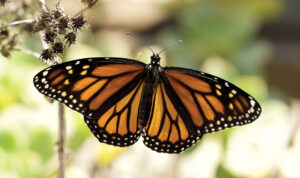 According to the Illinois Farm Bureau (IFB), Illinois agriculture needs to act before Monarch butterflies join a national list of threatened and endangered species. The state is developing two strategies. The first would be part of a multistate flyway plan and submitted to U.S. Fish and Wildlife. The other Illinois plan is to guide conservation efforts and be in place if monarchs become a threatened or endangered species.
According to the Illinois Farm Bureau (IFB), Illinois agriculture needs to act before Monarch butterflies join a national list of threatened and endangered species. The state is developing two strategies. The first would be part of a multistate flyway plan and submitted to U.S. Fish and Wildlife. The other Illinois plan is to guide conservation efforts and be in place if monarchs become a threatened or endangered species.
“We do have an opportunity in the writing of these two plans to convince Fish and Wildlife the listing is not necessary,” said Lyndsey Ramsey, IFB associate director of natural and environmental resources. “Monarchs need milkweeds and wildflowers.”
After being sued by environmentalists, Fish and Wildlife agreed to determine whether to list monarch butterflies as a threatened or endangered species by June 30, 2019. Before deciding, the federal agency will consider a regional flyway plan covering states throughout the Midwest and down to Texas, Ramsey explained.
“In five months, we (flyway states) need a draft plan,” she said, adding that draft will go through several revisions before a final plan is submitted next May to Fish and Wildlife.
The Illinois Department of Natural Resources (IDNR) is involved in the plans’ development, according to Ramsey.
As for the Illinois-only strategy, the University of Illinois-Chicago is coordinating efforts along with IDNR and Prairie Rivers Network. The effort is an offshoot of a September monarch summit that included different sectors, including agriculture. Ramsey and four Farm Bureau leaders represented agriculture.
Some groups want to start a conservation movement for monarchs, Ramsey advised.
“What I’ve heard from other groups, ‘If you (farmers) are confident you can control milkweeds in your fields, what’s the problem with letting them grow in ditches and fencerows?’” she warned.
For Illinois farmers, the fallout from the monarch becoming a threatened or endangered species could be substantial, according to Ramsey.
“It could impact farmers’ use of pesticides and mowing. You could be in trouble for incidental taking (killing) of butterflies,” she explained.
The geographic area impacted in Illinois could vary from areas where monarchs are found to anywhere considered critical for monarchs, Ramsey noted.
“Be aware (of the monarch effort),” Ramsey advised Farm Bureau members, “When there is opportunity to take action, we’ll let you know.”
Source: FarmWeek Now, Kay Shipman









